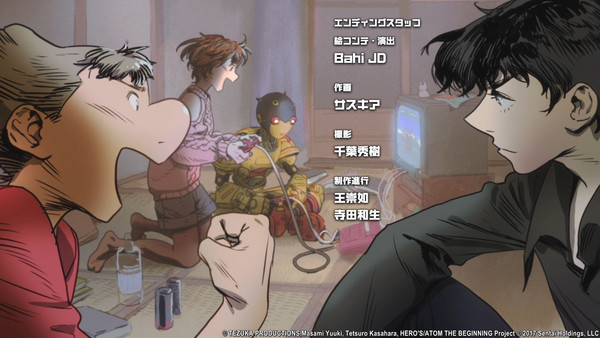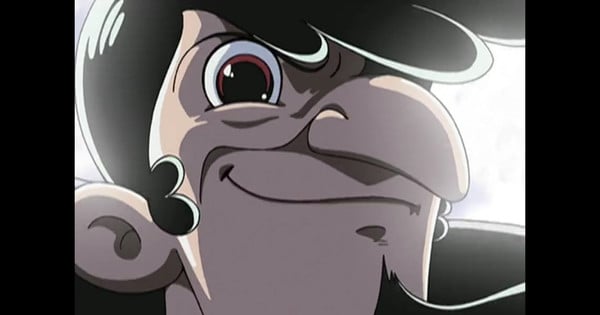Nick and Nicky check out the newest take on legendary manga creator Osamu Tezuka‘s Phoenix and take time to reflect the many iterations of his work through the years.
You can watch the Tezuka series mentioned here on Hulu/Disney+ (Phoenix: Eden17), Crunchyroll (Black Jack The Movie), Tubi TV (Astroboy – 2003), Pluto TV (Astroboy – 2003), Amazon Prime Video (Atom The Beginning, Dororo 2019), and RetroCrush (Black Jack The Movie, Jungle Emperor Leo 2009).
Disclaimer: The views and opinions expressed by the participants in this chatlog are not the views of Anime News Network.
Spoiler Warning for discussion of the series ahead.
Nick
You know Nicky, seeing as Steve and Chris got to cover the works and adaptations of a late legend of the anime/manga scene, it is only fair that we get to, too. I say we one-up them by going straight to the source of this whole mess—and I know just the immortal bird to take us there:

Nicky
Ah yes, nothing makes me start posturing about the meaning of time and space than after an encounter with some really spicy chicken.
Hulu and
Disney+ (depending on your region) recently released a new mini-series inspired by
Osamu Tezuka‘s
Phoenix by
Studio 4*C, fully titled
Phoenix: Eden17. Tezuka is cited as the “God of Manga” and the “Grandfather of Anime.” The first domestically produced adaption of a manga was the 1962
Astro Boy series created by
Mushi Productions, a studio founded and funded by Tezuka himself. Due to his lasting influence as a prolific mangaka and producer, Tezuka’s properties have continued to be adapted time and time and again.
He’s a name anyone into anime—and plenty who are not—recognize. However, whether or not those folks have seen or read anything he made is a different matter. Anime fandom notoriously skews younger, and with following seasonal releases being the dominant mode of engagement, it’s entirely possible that most current fans only know him by reputation.
There is also a bit of a stigma about experiencing “the classics” in terms of anime. Lots of older series had poor production values. When
Astro Boy premiered, Mushi Pro was behind what their overseas counterpart could produce, relying on cost-cutting measures to cope with the week-to-week broadcast and being black and white when most English-speaking families had colored TVs in their homes. Besides, nowadays, many series are just not available for streaming. However, that is not universally true, and because Tezuka’s ideas are so influential, plenty of iterations, new and old, are scattered around across different streaming services.

I was surprised to find the 2003
Astro Boy still around, including the old dub. Staff produced it to celebrate the original series’ 40th anniversary. I caught it airing on
Toonami as a kid.
I still need to watch that one. Call me a hipster, but if I want to experience the classics, I want all that old, janky production. Newer reboots or re-imaginings can look snazzier and evolve to meet modern storytelling standards. However, something’s lost after viewing a product with decades of hindsight and self-mythologizing.
It did not get good ratings when it aired, but it is solid, according to past reviews, and I enjoyed it. My favorite part is how well it adapts Tezuka’s cartoony designs into very sleek and puts more of a cyberpunk element with a darker color palette to match a slightly darker tone of the story.


There is also the 1980s version by mecha and sci-fi anime director
Noboru Ishiguro, which is closer to the original anime but in color. We see how much of Tezuka’s work reflects the times they were made.
I do appreciate them trying to capture Tezuka’s style. One of the noticeable trends in modern adaptations or spin-offs based on his works is that they hesitate to emulate his art style. I understand why you would want your shiny new adaptation not to look like the weirdest, horniest volume of Asterix ever dreamt up.
It depends on the series. Both the manga and anime for
Atom The Beginning is a huge departure in art style in an attempt to capture a more easy-going tone, and it works, but it is also a different kind of story. I’m not going to get over pretty boy Dr. Tenma, though.


It works better at a “modernized” take on those designs than some other post-2000 attempts. Like, holy crap, what did they do to you, Leo?

This must be what it’s like for a wolf born in the wild to see a chihuahua for the first time. God damn.
I like it about as much as the
Young Black Jack series. I don’t know what makes him so uncanny compared to other anime dudes, but something about the proportions makes me feel like he botched his face surgery.

That’s also probably because the Dezaki OVAs and movie spoiled me.


Dezaki also helped make
Black Jack as a character and series iconic. Those OVAs are some of the wildest,
most gripping pieces of animation you can find. I don’t know if they are wholly accurate to the source manga, but at the very least, they align with the often bizarre, creative, sometimes baffling turns Tezuka’s stories would often take. Meanwhile, I could not tell you a damn thing about
Young Black Jack – partly because it is not streaming anywhere but mostly because it just did not pack that same punch.
I remember from reading Rose Bridge’s daily streaming reviews that there were many war and piss crimes. It seemed like it was trying to do a take on the nature of war, but it was mainly just unpleasant and dry in its presentation, so I could never stand to watch it. It’s overall just a dull take on the character who is the best when he’s doing
insane medical feats and adding fun speculation.

That sounds about right. To be fair to the
Young Black Jack creators, that particular property is hard to sell in a modern media landscape. What makes Tezuka’s work so interesting is how primordial it is, coming from a time when expectations for storytelling were highly nebulous. Creatives flew by the seat of their pants. Just about any Tezuka work can veer wildly in tone, scope, setting, or character focus in ways that feel offputting or downright crazy compared to modern shows. There’s a reason the 2019
Dororo – the most recent direct adaptation before
Eden 17 – took so many liberties with the material.

Part of that was because the original didn’t have a discernible end. The remake excelled thanks to excellent scripting from
Yasuko Kobayashi.
Sure, but a lot of it was also realizing that modern audiences are primed for a full-on dark fantasy story in 2019, and leaning into a more realistic style and heavier tone was much more likely to sell.
Dororo 2019 is a real gem, too. I have a big soft spot for it. Tezuka’s relationship with dark works is complicated because critics praised him for handling mature themes in a way that fascinated both children and adults. At the time, many of his competitors leaned more on the “adult” side, with upcoming stars such as
Go Nagai and others producing grittier and grittier stories.
Dororo was supposed to be Tezuka’s entrance into the “Gekiga” movement.
As you can see from this official clip, the original anime was also pretty dark. Where the 2019 anime succeeded was injecting a lot more characterization and heart into it to balance that darkness, particularly in the relationship between Hyakkimaru and Dororo.
It certainly does a good job of fleshing those two out – literally in Hyakkimaru’s case – and for all its liberties, it aligns with Tezuka’s pet themes and ideas. That is not something I can say about
Eden 17, as the mini-series excises vast swaths of the original story to make its point much more muddled. For instance, you would never know this is a
Phoenix story if it weren’t for the title.

Big Bird shows up once in the first episode and then only appears at the end to look the viewer in the eye as if to say, “damn, that was crazy, huh?”
I thought it was trying to be like the old
Phoenix: 2772 movie and make some significant changes. However, the new version is even more divergent than that. It adapts the “Nostalgia” chapter on the desert planet Eden 71. For readers who may be unaware, the manga version of
Phoenix is supposed to be an anthology, telling multiple stories across space and time, often with reincarnations and recast versions of his characters, referred to as the Tezuka Star system. The
Phoenix is always an observer of events. However, what makes
Phoenix so unique is how it was published. Its publication history spanned decades. Tezuka would work, leave, and return to it in different eras. It is considered his life’s work.
Though, I’m sure Nick knows all this because he covered the 2004 series with Steve.
Yep, and one of the things that struck me about that TV series was the sheer scope of its stories. Whether historical epics, ghost stories, or bonkers speculative sci-fi, they swung for the fences in ways that didn’t always work but were memorable nonetheless.
Eden 17 has that, inheriting some of the original’s wonky pacing and story structure, but it also streamlines a ton of things, including all the incest.

Part of this is that they add the shape-shifting Moopy creature earlier in the narrative. So, this boy only has babies with a thing that
looks like his mother and not like his actual mother, who has been asleep in suspended animation for 1300 years.


It also smartly excises the SECOND incest subplot where Romi also has children with her grandkids, who are also her children. You can probably see why
Studio 4*C would avoid triple-dipping on Oedipal insanity.

It also wisely addresses that the whole “Go into cold sleep for 13 years and let a robot raise my son on an uninhabited planet” idea kinda royally screwed up said son.


Yeah, there’s more perspective on Cain; unfortunately, he also kills his only family, the robot, Shiva. It’s fitting for his namesake.

RIP MILF BB-8. We hardly knew ye.
It’s a well-directed mini-series on its own. I put it in the same box as
Exception, as big-brained, complex sci-fi stories are getting rarer as time goes on.
I like certain aspects of it, some inherited from the source and others all its own. It captures the story’s scale in a way the manga never did. This is a millennia-galaxy-spanning story that operates on both personal and societal levels of commentary, and the presentation does a great job of walking that tightrope.

Part of that is that our ideas of science and science fiction have evolved since the almost 50 years when Tezuka wrote the story. However, the fact that you can still take it and make it a good story says something. Tezuka was prolific, which means he had to make everything quickly. He threw ideas around a lot, resulting in hits and misses. He was also pretty weird. Once you watch something like, say,
Cleopatra, Queen of Sex, you do not look at his work the same way. (Though, we did get
Belladonna of Sadness out of it.)
Also, being familiar with the ’04 series, seeing elements from other sci-fi arcs was cute. For instance, the alien that Cain starts a whole civilization with is the same shape-shifting race featured in the “Future” arc.


The movie can be watched on its own just fine, but it is important to look at the bigger picture when it comes to
Phoenix as an anthology work and Tezuka’s career. The guy made over 700 series in his 60-year lifespan.

Removing the Phoenix‘s role as a narrative frame is a miss, too. Almost every part of the story, including the futuristic settings, is supposed to be a part of history in the eyes of an eternal entity like the Phoenix. Many of Tezuka’s star characters are missing. However, you know what they say, “Those who do not learn history are doomed to repeat it.” Narrative separates what we call history from just random things people do.
There are just weird changes that don’t pay off. They introduce a whole backstory for Romi, where she was part of some eugenics orphanage, but it never goes anywhere and is actively damaging to the ending of her story.


I completely blocked this part from my brain because it is unnecessary. I’m surprised they could get a whole movie’s worth of time from just the one arc.
Maybe it’s a change that makes sense in the
theatrical version since that is supposed to have a different ending for some reason. Which on its own is just a bizarre decision. This isn’t
Dororo, where there was no conclusion – the “Nostalgia” arc of the manga very much had an ending. Even if you won’t stick with it, why turn this into a Choose Your Own Adventure movie?
When encountering older works, our sensibilities clash, and sometimes, we project modern ones that do not fit the original work, or past sensibilities may reflect poorly in the future. Tezuka was both ahead of his time and of his time. Sometimes adaptations can smooth out the edges but still make mistakes. After all, no matter how many years pass, making art and telling stories has never been easy.
It says a lot that I am very positive about most of the adaptations of Tezuka’s work. It shows that a lot of the people making them cared.
If nothing else, seeing new takes on classic media is always interesting. Not all modern reboots of classic
Tatsunoko shows from the early 2010s worked either. However, it was intriguing to see how new creators would interpret or reconstruct the aspects of those works that resonated with them, which is why I am incredibly excited to see the long-awaited
Pluto anime.
Pluto in concept is extremely fascinating, especially now that
Studio M2 is animating it. It is a manga by
Naoki Urasawa, whom you may recognize as the manga creator of
Monster,
20th Century Boys, and the host of the manga docuseries
Manben.
Pluto is supposed to be a dark and realistic noir murder mystery reimaging of
Astro Boy. Tezuka’s son supervised the manga.

So not only does an anime team have to take significant consideration towards Tezuka’s legacy, but they also have to live up to Urasawa’s prestigious reputation! That is a tall order! The staff were quiet for about five years after the anime series’ existence was leaked at the MIFA film market in 2017.
It’s one of those productions nobody ever thought would happen, but I am so happy it is. Tezuka’s legacy is vast and expansive, and while not every attempt to add to it works, getting stuff like this makes it all worth it.
While we covered many series that lean into the darker aspects of Tezuka’s work, they are not total departures. There are many child-friendly Tezuka anime, too. However, Urasawa noted that Tezuka’s work was mature and that the sanitization of his work is a modern phenomenon. He also acknowledged that adapting Astro Boy with the care and respect required to draw Pluto was a colossal undertaking, and he would not recommend it.
It shows how much respect he and other creators have towards the “God of Manga” and his influence. It is a shame that more of these works are not readily available.
Yeah, it took some digging to find everything we discussed today, and that was only for a few titles. Still, there are others that we don’t mention that are available, too. As for reading, most of what is available are his most prominent works, but there is good documentation about them if you want to get a background. I got great info from the
official English site, and they also have the official
Tezuka Productions YouTube channel for English speakers with full episodes, including dubs and subs.
It’s great that there are at least some resources, but it highlights how inadequate streaming is for preserving media. The market forces make licensing older titles a gamble at best, especially ones that lack a clear hook. Even releases for his manga are a crapshoot. Does anyone remember
Digital Manga Publishing‘s never-ending Kickstarters for various Tezuka series?
It shows how little profit translates from other important values, like history and culture. Nevertheless, I will never stop encouraging people to try and enrich themselves through anime and manga. I’m grateful for
Helen McCarthy‘s
The Art of Osamu Tezuka: God of Manga for changing how I viewed his work when I read it in college. I don’t think everyone has to like Tezuka’s work, but they should at least regard it like they do an older relative or an ancestor because, without it, anime would have never been born.

Wait a minute…that means he’s technically to blame for me having to watch all these isekai shows, too! Never mind, scrap it all and let the Moopy inherit the planet.



































